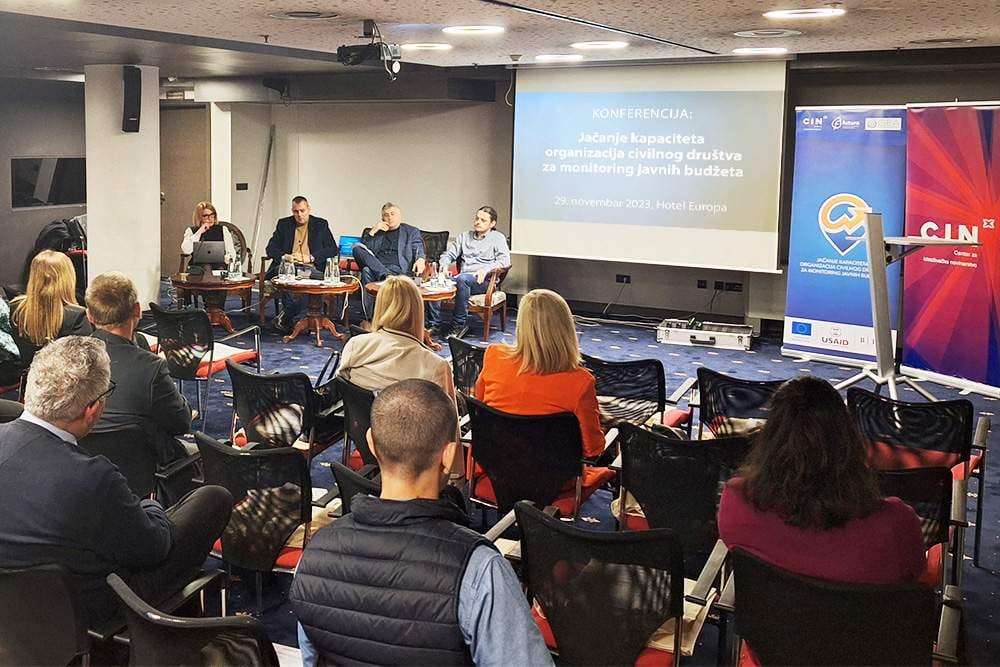Over the past three years, the Center for Investigative Reporting (CIN) from Sarajevo, GEA from Banja Luka, and Futura from Mostar have been actively involved in improving procedures for the use of public funds, increasing citizens’ knowledge about budget implementation, and urging public officials to responsibly manage public funds.
The project ‘Strengthening the Capacities of Civil Society Organizations for Monitoring Public Budgets’, which united these three organizations, has been successfully completed, and its results have directly contributed to the fight against corruption by enhancing transparency in the use of public funds and establishing procedures that provide equal access to public funds for all citizens.
As part of the project, five policy papers were created, identifying problems and providing recommendations for improving budget transparency, better control and allocation of budgetary funds, and preventing misuse of public funds.
As highlighted by Marko Martić from GEA, these documents are the result of months-long analyses of budgetary processes at all levels of government in Bosnia and Herzegovina, covering planning, adoption, execution, and monitoring of budgets in institutions and reporting on public money spending.
„It was important for us to identify systemic errors. In this process, we observed various weaknesses in institutions, such as low involvement of public and non-governmental organizations in budget monitoring, adopting budgets without public debate, improper budget rebalances, non-transparent budget execution reports, and more“, said Martić.
Detailed analyses of budgetary processes in Bosnia and Herzegovina have generated specific recommendations for decision-makers to improve budget implementation. Round tables and public discussions organized as part of the project have contributed to networking representatives of institutions, the private sector, and civil society around the common goal of fighting corruption and ensuring transparent use of public funds.
According to Martić, the response from institutional representatives at these events was significant, which facilitated the dialogue in addressing these issues collectively. Although the project has identified practical mechanisms that need improvement in various budget execution processes at different levels of government, Leila Bičakčić, the executive director of CIN, believes that the effects and results of the project are yet to be seen.
“Public authorities need to demonstrate readiness to accept recommendations coming from civil society or involve the broader public in decision-making and monitoring of any activity that involves spending public money. Unfortunately, this often does not happen willingly, but only after additional pressure is exerted onto the authorities concerned”, said Bičakčić.
As part of the project, CIN implemented investigative stories that pointed out specific problems in the system and abuses of public funds, which prompted reactions by the authorities and investigative bodies.
Project participant and economic analyst Faruk Hadžić believes that civil society in Bosnia and Herzegovina faces challenges in monitoring public spending due to limited knowledge of budgeting processes and the way institutions improperly present budgets.
„Often, some items in the budget are packaged in a way that makes it difficult to understand where the money is actually going. Therefore, it is important to raise the level of economic literacy of citizens which would lead to critical thinking about the information provided by decision-makers. Ignorance gives great power to decision-makers, which ultimately leads to manipulation of public funds“, said Hadžić.
As part of the project, a survey of citizens and representatives of civil society organizations was conducted through 28 questionnaires. The results showed that the majority do not understand corruption and budgetary processes.
According to Marin Bago from Futura, the problem regarding monitoring public spending lies in the insufficient capacity of organizations that could do this task.
„In Bosnia and Herzegovina, there are more than 27 thousand civil society organizations, and our analysis has shown that according to their understanding of corruption, goals, and desires, they can monitor budget spending in only seven or eight cities. Qualitative research is the foundation of everything, and that is why we approach all our actions in this way. Knowledge of budgetary processes must be available, but the current question is who will monitor them“, concluded Bago.
The project has also established a permanent database of all project results, which will remain as educational models for civil society organizations and other interested actors in the context of monitoring public spending.
The project ‘Strengthening the Capacities of Civil Society Organizations for Monitoring Public Budgets’ was financed by the European Union and The Balkan Trust for Democracy through USAID.







